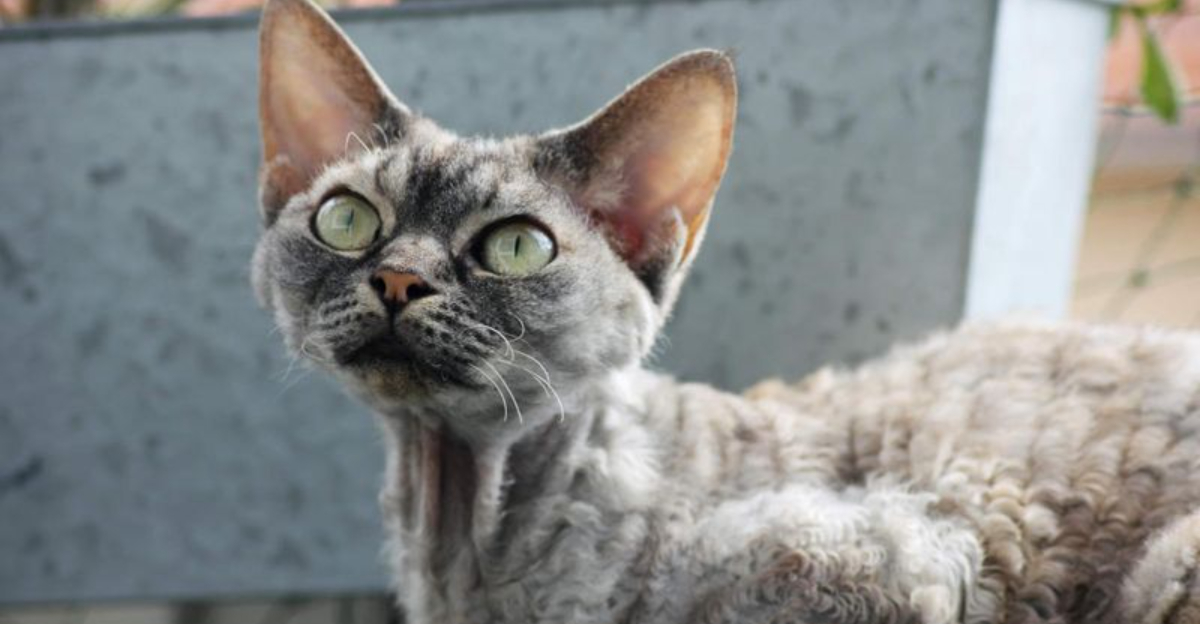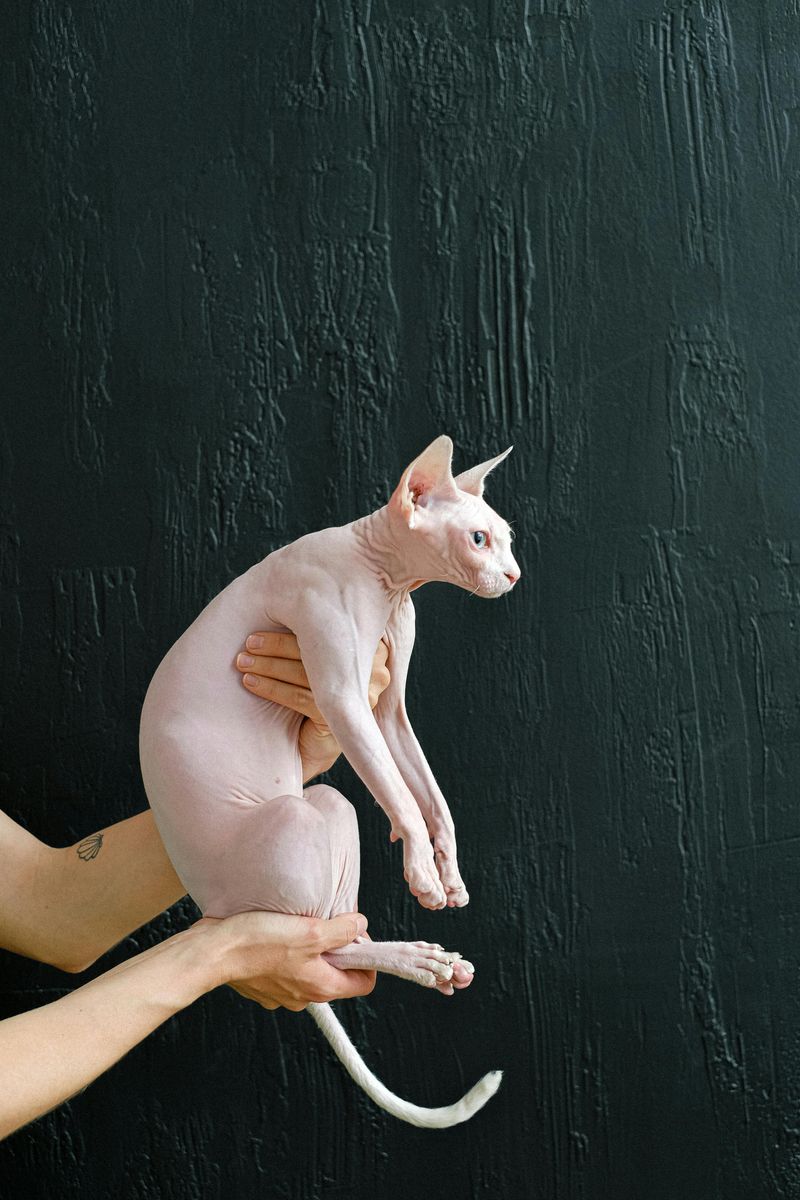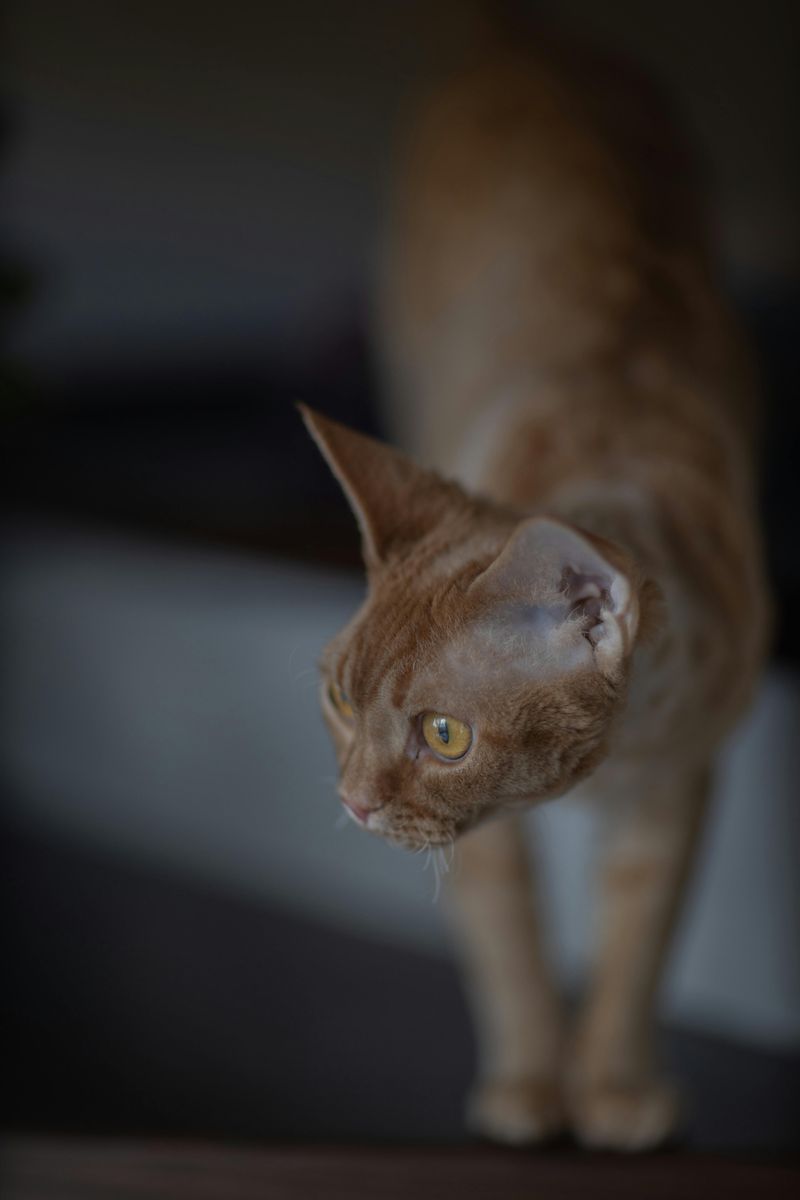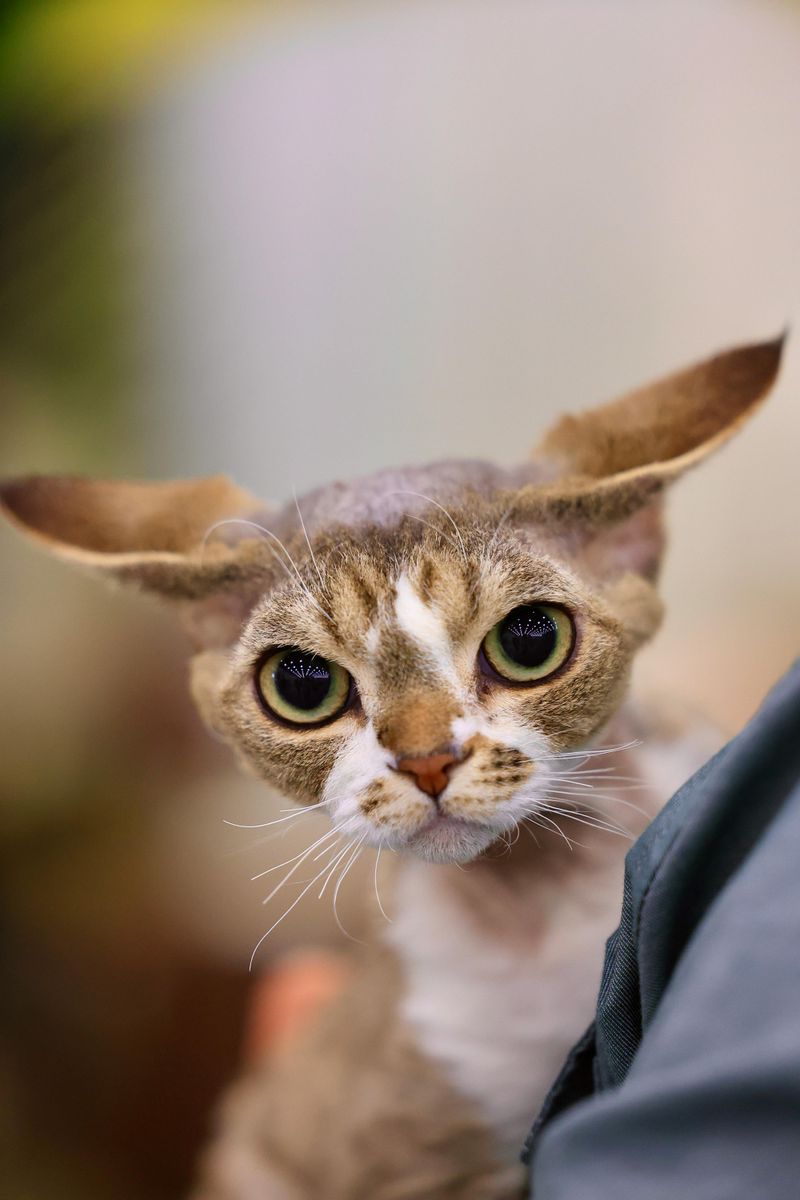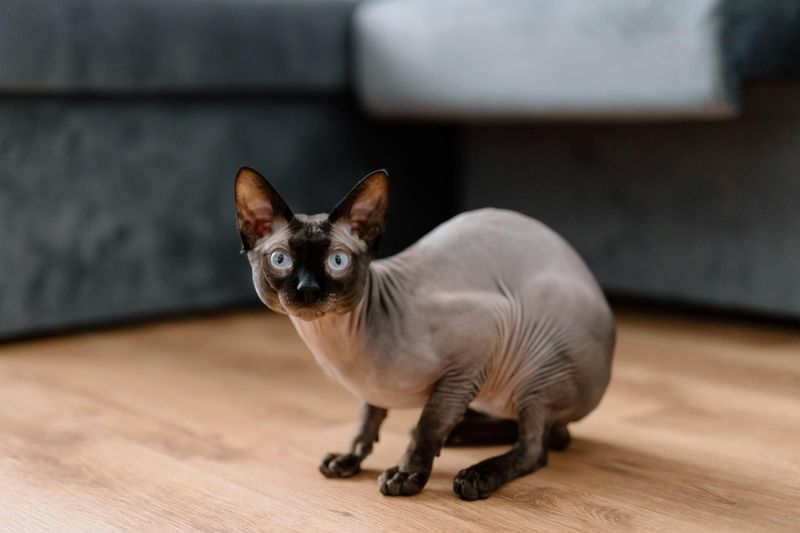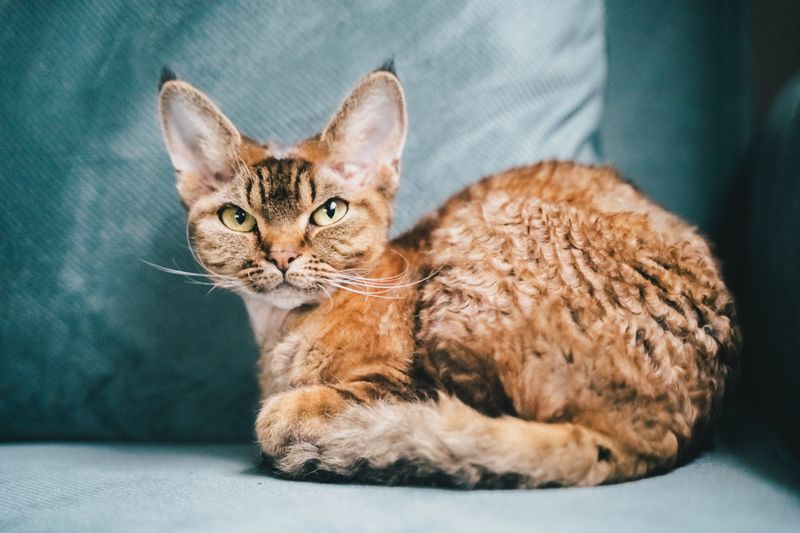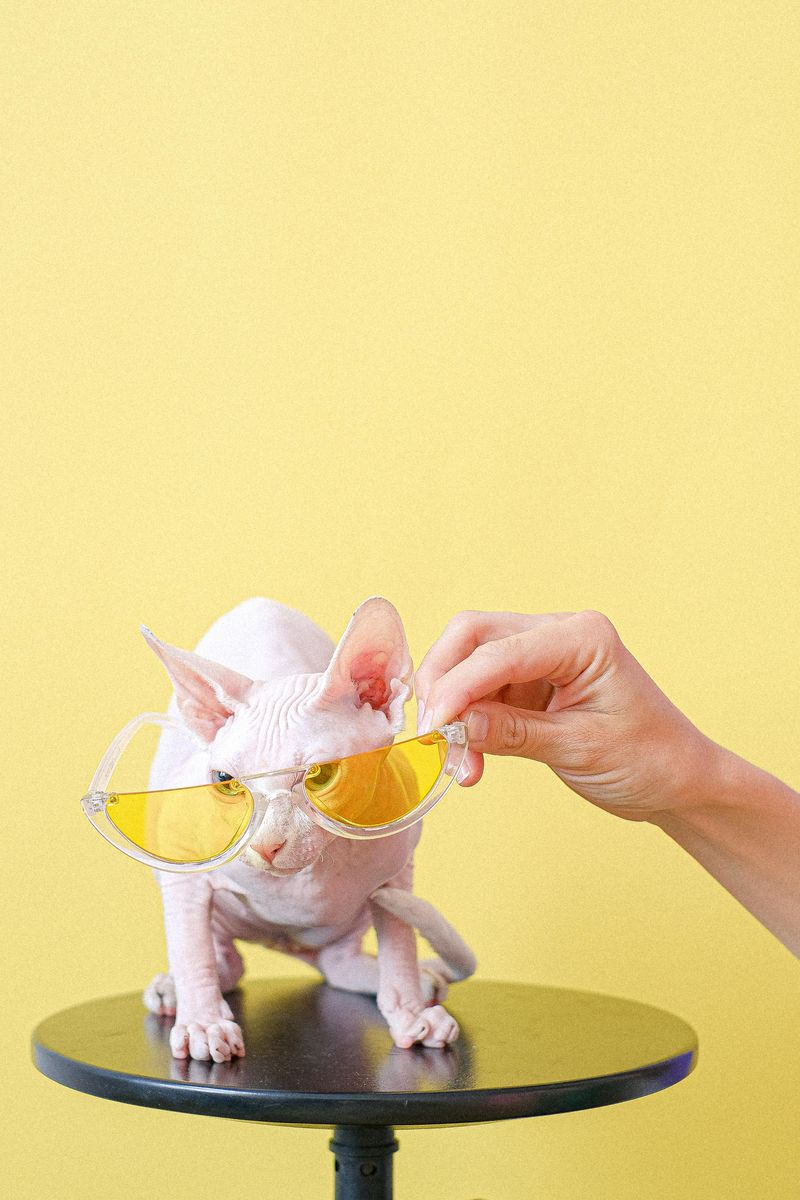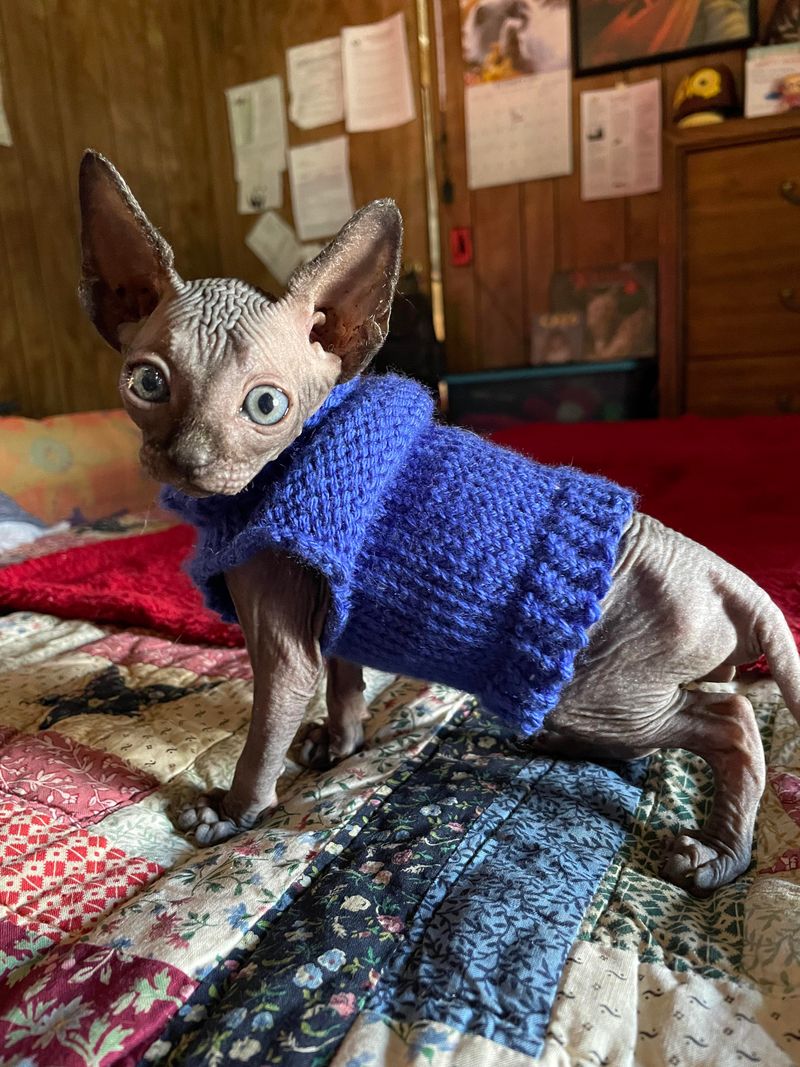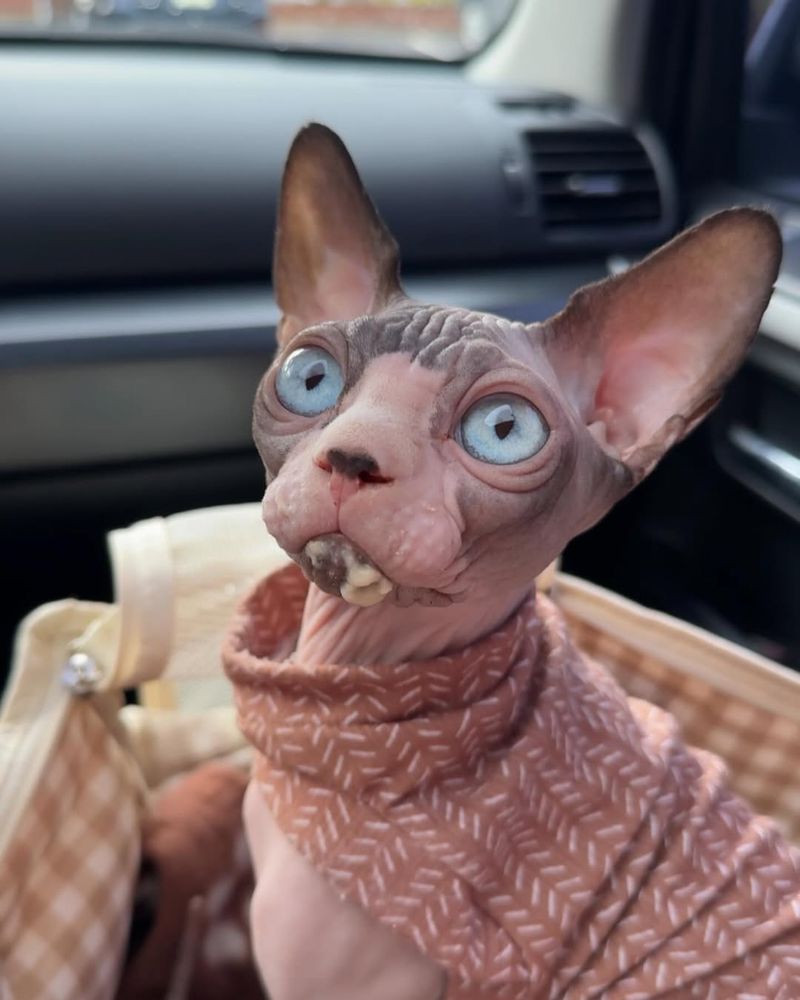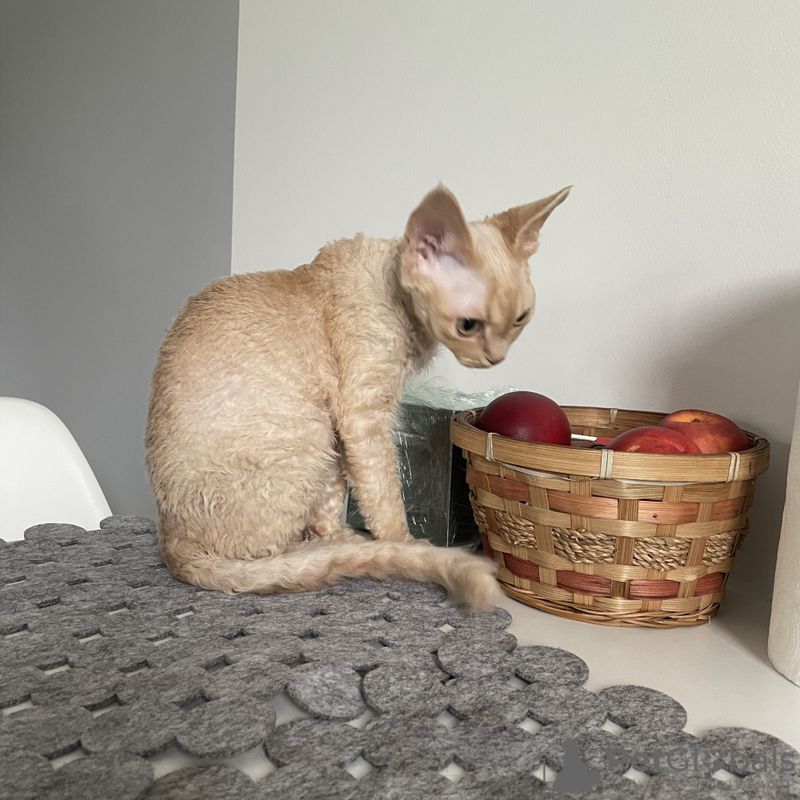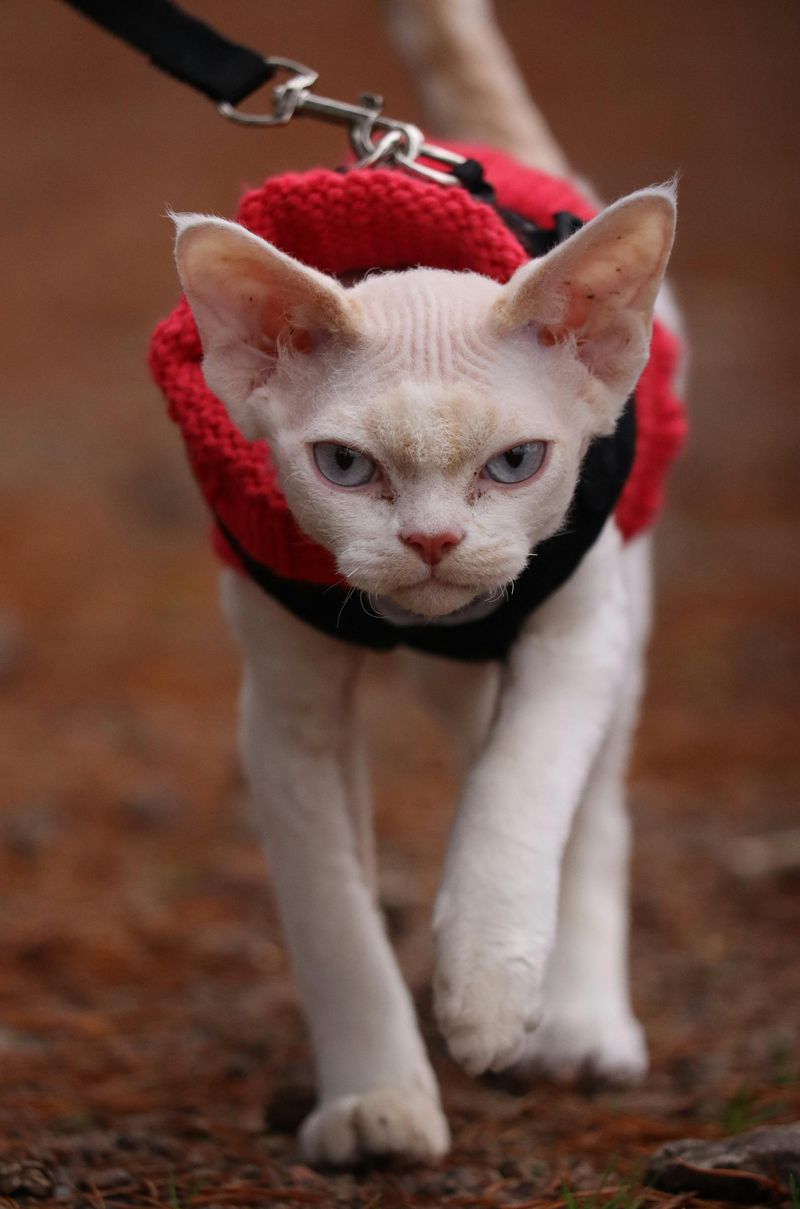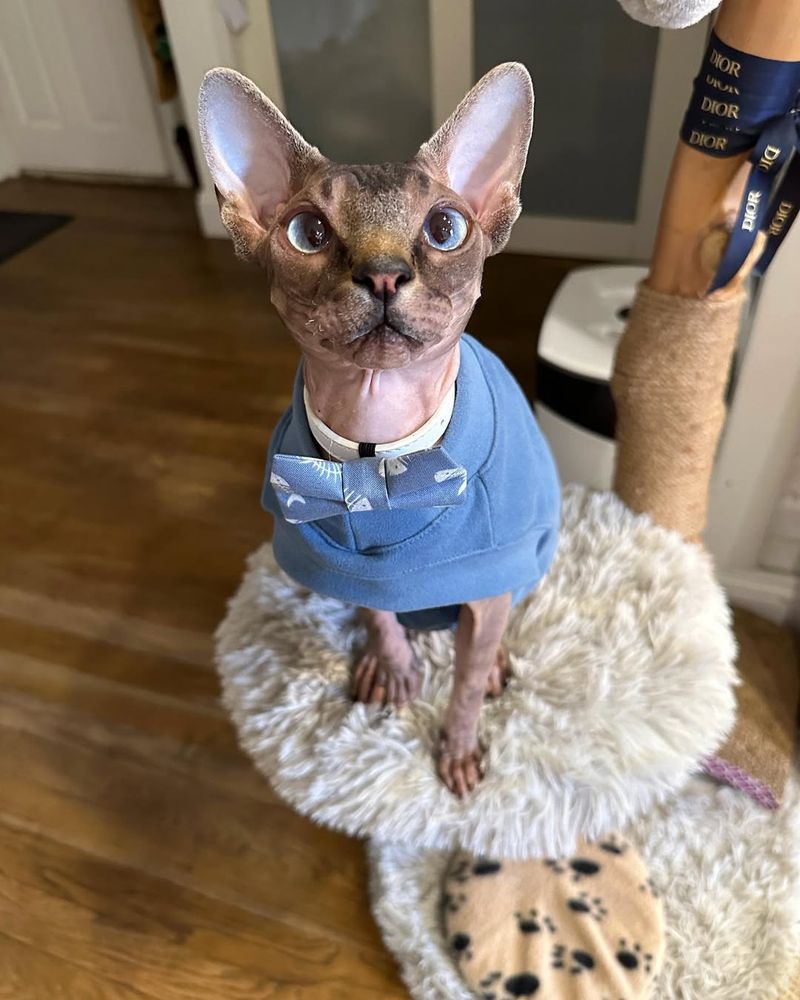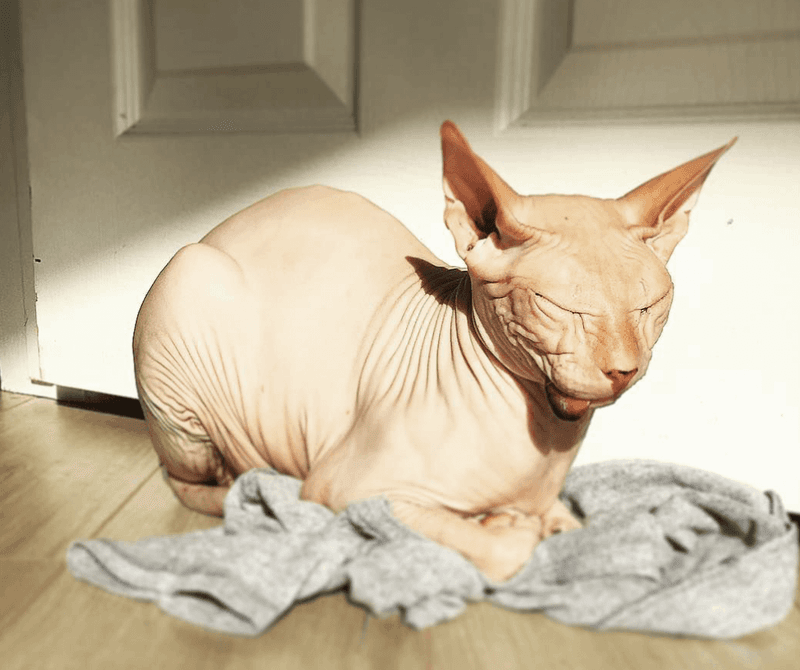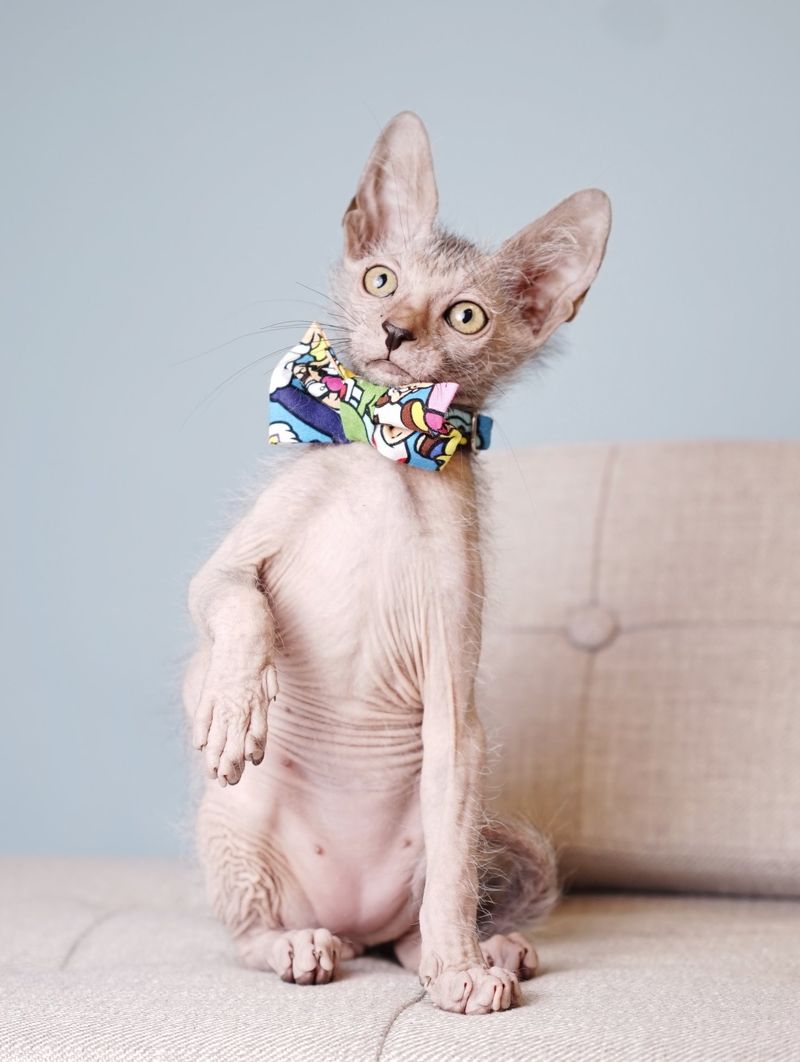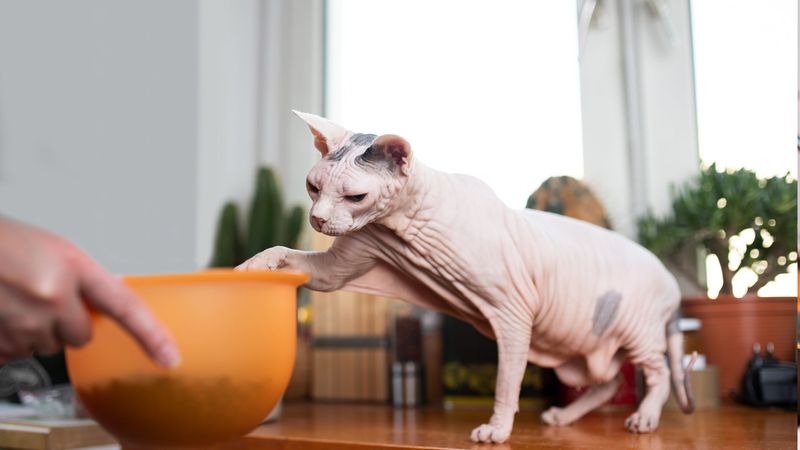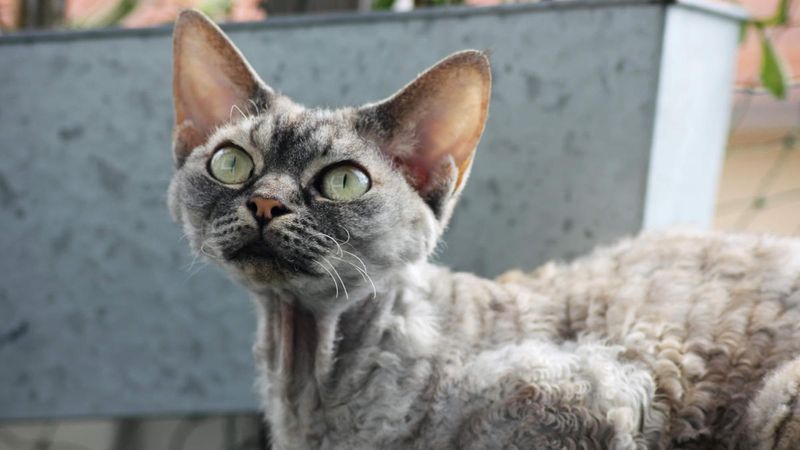📖 Table of Content:
- 1. Coat Type: The Biggest Difference
- 2. Grooming Needs
- 3. Whiskers & Eyebrows
- 4. Body Shape
- 5. Ears: Big vs. Bigger
- 6. Energy Levels
- 7. Warmth & Sensitivity to Cold
- 8. Facial Features & Expression
- 9. Intelligence & Trainability
- 10. Social & Affectionate Nature
- 11. Vocalization & Communication
- 12. Skin Sensitivity & Care
- 13. Playfulness & Need for Entertainment
- 14. Diet & Metabolism
- 15. Lifespan & Health Differences
The Sphynx and Devon Rex are two extraordinary cat breeds, each with distinct characteristics that make them stand out. While both are known for their unique appearances, their differences go far beyond their coats. The Sphynx, with its hairless body and suede-like skin, exudes an air of elegance and warmth. In contrast, the Devon Rex has a soft, curly coat, giving it a playful and mischievous look that matches its lively personality.
Beyond their physical traits, these breeds also differ in their expressions and facial features. The Sphynx has a strong, angular face with high cheekbones, giving it a striking and regal presence. Meanwhile, the Devon Rex sports large, wide-set eyes and oversized ears, often described as having a pixie-like or elf-like appearance. These features contribute to their charm, making them instantly recognizable and adored by cat lovers worldwide.
Personality-wise, both breeds are affectionate and social, but they interact with their humans in different ways. The Sphynx craves attention and enjoys being the center of affection, often following its owner around and seeking constant companionship. The Devon Rex, while still loving, tends to be a bit more independent and playful, entertaining itself with acrobatics and clever antics. Whether you’re drawn to the Sphynx’s bold personality or the Devon Rex’s quirky charm, both breeds bring joy and companionship in their own special ways.
1. Coat Type: The Biggest Difference
With a look unlike any other, Sphynx cats stand out due to their completely hairless bodies, covered only by soft, suede-like skin. Their lack of fur not only defines their striking appearance but also demands special grooming and skincare routines. On the other hand, the Devon Rex possesses a delicate, wavy coat that feels velvety and plush to the touch. This fine, curly fur gives them a whimsical charm while still requiring gentle care to maintain its unique texture. The stark contrast between these two breeds is most evident in their coats—or the absence of one in the case of the Sphynx. While the Sphynx relies on skin oils and frequent baths to stay clean, the Devon Rex benefits from its light fur, which provides some insulation while remaining low-maintenance. Each breed offers a different tactile experience, appealing to cat lovers who appreciate either the smooth warmth of the Sphynx or the soft, rippled coat of the Devon Rex. Their distinct fur types also play a role in how they interact with their environment and regulate body temperature.
2. Grooming Needs
Because Sphynx cats lack fur to absorb natural skin oils, they require frequent baths to prevent buildup and potential skin issues. Without regular cleaning, their skin can become oily and prone to irritation, making grooming an essential part of their care routine. This high-maintenance requirement ensures their comfort and overall health, but it also means owners must be committed to consistent skincare. In contrast, the Devon Rex’s short, wavy coat naturally regulates oil distribution, requiring only occasional wiping to stay clean. The grooming needs of these two breeds vary significantly, reflecting the impact of their unique coat types. While Sphynx cats need weekly or biweekly baths, Devon Rex cats can maintain their hygiene with much less effort. This lower-maintenance grooming routine makes the Devon Rex an appealing choice for those looking for a pet that requires minimal upkeep.
3. Whiskers & Eyebrows
A notable feature of Sphynx cats is their minimal whiskers and eyebrows, often appearing almost non-existent. This lack of facial hair adds to their alien-like charm and distinct look. In contrast, Devon Rex cats sport short, curly whiskers and sparse eyebrows. These quirky features contribute to their pixie-like appearance, adding character to their expressive faces. The difference in facial hair between the breeds not only distinguishes them visually but also adds to their unique personalities. Each cat’s facial features enhance their adorable and quirky charm, endearing them to cat lovers.
4. Body Shape
Sphynx cats are medium to large, muscular, and sturdy, presenting a robust and athletic appearance. Their well-defined muscles and strong frames convey a sense of strength and agility. Conversely, the Devon Rex is small, slender, and fine-boned, exhibiting a delicate and graceful build. This lean physique is complemented by their playful and agile nature. The contrasting body shapes highlight the diversity in physical traits between these breeds, offering potential cat owners a choice based on appearance preferences and lifestyle suitability. Each breed’s unique build contributes to their overall charm and appeal.
5. Ears: Big vs. Bigger
Both Sphynx and Devon Rex cats are renowned for their large ears, but the Devon Rex takes it a step further with oversized, “bat-like” ears that are even larger in proportion to their head. The Sphynx, with its large, open ears, exudes an alert and curious demeanor. These pronounced ears are not just a distinctive physical trait but also contribute to their expressive and engaging facial expressions. The exaggerated ear size in Devon Rex cats adds to their elf-like appearance, making them truly stand out in the feline world. These unique ear shapes enhance their overall charm.
6. Energy Levels
Highly active and playful, Sphynx cats are always on the move, seeking attention and engagement from their owners. Their boundless energy means they thrive on interactive play, climbing, and exploring their surroundings. Without enough stimulation, they can become restless, making regular playtime an essential part of their care. Their social and energetic personalities make them ideal for owners who enjoy an interactive and constantly entertaining pet. Devon Rex cats, while also energetic, tend to have a more balanced activity level. They experience playful bursts of excitement, engaging in acrobatics and mischief, but also enjoy curling up for extended periods of rest. This mix of liveliness and relaxation makes them well-suited for a variety of household environments, adapting easily to both active and more laid-back lifestyles.
7. Warmth & Sensitivity to Cold
Although Sphynx cats may feel warm to the touch, their lack of fur makes them highly sensitive to cold. Without a protective coat, they lose body heat quickly and often seek warmth from blankets, heated beds, or even pet-friendly clothing. Owners must be mindful of maintaining a consistently warm environment, especially in colder climates, to ensure their comfort and well-being. This temperature sensitivity is a key consideration for those thinking about adopting a Sphynx, as extra care is needed to keep them cozy year-round. Devon Rex cats, while not completely hairless, also have minimal fur and are somewhat sensitive to cold. Their short, wavy coat provides a bit more insulation than the Sphynx’s bare skin, but they still enjoy warm spots and soft blankets. On chilly days, they may gravitate toward sunlit windows, heated beds, or snuggling up with their owners for extra warmth.
8. Facial Features & Expression
The Sphynx cat features a strong, angular face with prominent cheekbones, giving them a chiseled and striking appearance. This defined facial structure adds to their regal and sophisticated look. In contrast, the Devon Rex has a pixie-like face characterized by a short nose and wide-set eyes. This fairy-like appearance enhances their whimsical and endearing charm. The distinct facial features of each breed contribute to their overall allure, offering diverse aesthetic appeals. Potential cat owners can select a breed based on their preference for strong and angular looks or a more delicate and whimsical face.
9. Intelligence & Trainability
Highly intelligent and eager to engage, Sphynx cats thrive on learning tricks and participating in interactive play. Their curiosity and desire for attention make them highly trainable, responding well to positive reinforcement and mentally stimulating activities. Whether it’s fetching toys, learning commands, or solving puzzle feeders, they enjoy the challenge and bond that training provides. Their playful and people-oriented nature means they often seek out opportunities to interact, making them a great choice for owners who enjoy teaching their pets new skills. Devon Rex cats, while equally intelligent, tend to display their cleverness in a more independent and mischievous way. Rather than eagerly following commands, they prefer to explore, problem-solve, and entertain themselves with their own antics. Their intelligence shines through in their ability to navigate high places, open doors, or figure out creative ways to get what they want.
10. Social & Affectionate Nature
Sphynx cats are known for their extremely affectionate nature, constantly seeking attention and companionship from their humans. Their social behavior fosters strong bonds and makes them ideal for those seeking an interactive and loving pet. Devon Rex cats, while also loving, display a slightly more independent demeanor. They enjoy affection but do not require constant attention, making them suitable for individuals who appreciate a more balanced relationship. The social and affectionate traits of these breeds provide potential owners with options depending on their preference for a devoted companion or a more independent feline friend.
11. Vocalization & Communication
Known for their chatty and expressive nature, Sphynx cats love engaging in “conversations” with their human companions. They use a wide range of vocalizations, from meows to chirps and even playful yowls, to communicate their needs and emotions. Whether they are asking for food, attention, or simply responding to their owner’s voice, Sphynx cats are rarely silent. T heir talkative nature makes them excellent companions for those who enjoy an interactive and communicative pet, always ready to express themselves in a lively and engaging manner. Devon Rex are more reserved in their vocal expressions, though they still find charming ways to communicate. Rather than frequent meows, they often rely on soft chirps, trills, and quiet murmurs to convey their excitement or affection.
12. Skin Sensitivity & Care
Prone to skin issues such as acne, sunburn, and dryness, Sphynx need specialized skin care. Their hairless nature demands regular attention to maintain healthy skin. Devon Rex cats, although possessing less sensitive skin, can still experience irritation and require protection from harsh conditions. This need for skin care emphasizes the importance of dedicated grooming routines and protective measures for both breeds. Potential cat owners must be prepared to invest time and effort in skin care to ensure their feline companions remain healthy and comfortable, reflecting the unique demands of each breed.
13. Playfulness & Need for Entertainment
Sphynx cats are known for their boundless energy and love for play, making them one of the most active feline breeds. They thrive on interactive toys, climbing structures, and puzzle games that challenge their intelligence and keep them engaged. Without enough stimulation, they can become restless or seek attention in mischievous ways. Their constant need for entertainment makes them a great match for owners who enjoy interactive playtime and are willing to provide plenty of mental and physical engagement. Devon Rex cats, while equally playful, have a more balanced approach to activity. They enjoy bursts of energy where they engage in acrobatic antics but also appreciate lounging in high perches, quietly observing their surroundings.
14. Diet & Metabolism
The increased dietary need is crucial for their overall health and well-being of the Sphynx. Devon Rex cats have a normal metabolism but enjoy frequent snacks, reflecting their playful and curious nature. The difference in dietary requirements underscores the importance of tailored feeding plans for each breed. Potential cat owners must be mindful of these nutritional needs, ensuring their feline friends receive appropriate diets to support their unique metabolic demands and maintain optimal health.
15. Lifespan & Health Differences
Both breeds typically live between 12-15 years, with the Devon Rex potentially reaching up to 16 years. While both breeds generally enjoy good health, Sphynx cats are more prone to heart-related health concerns, requiring regular veterinary check-ups. Devon Rex cats, on the other hand, can be susceptible to genetic conditions such as patellar luxation. Understanding these health differences is vital for potential cat owners, ensuring they are prepared for any medical needs their chosen breed may have. Regular vet visits and preventive care are essential in maintaining their health.
